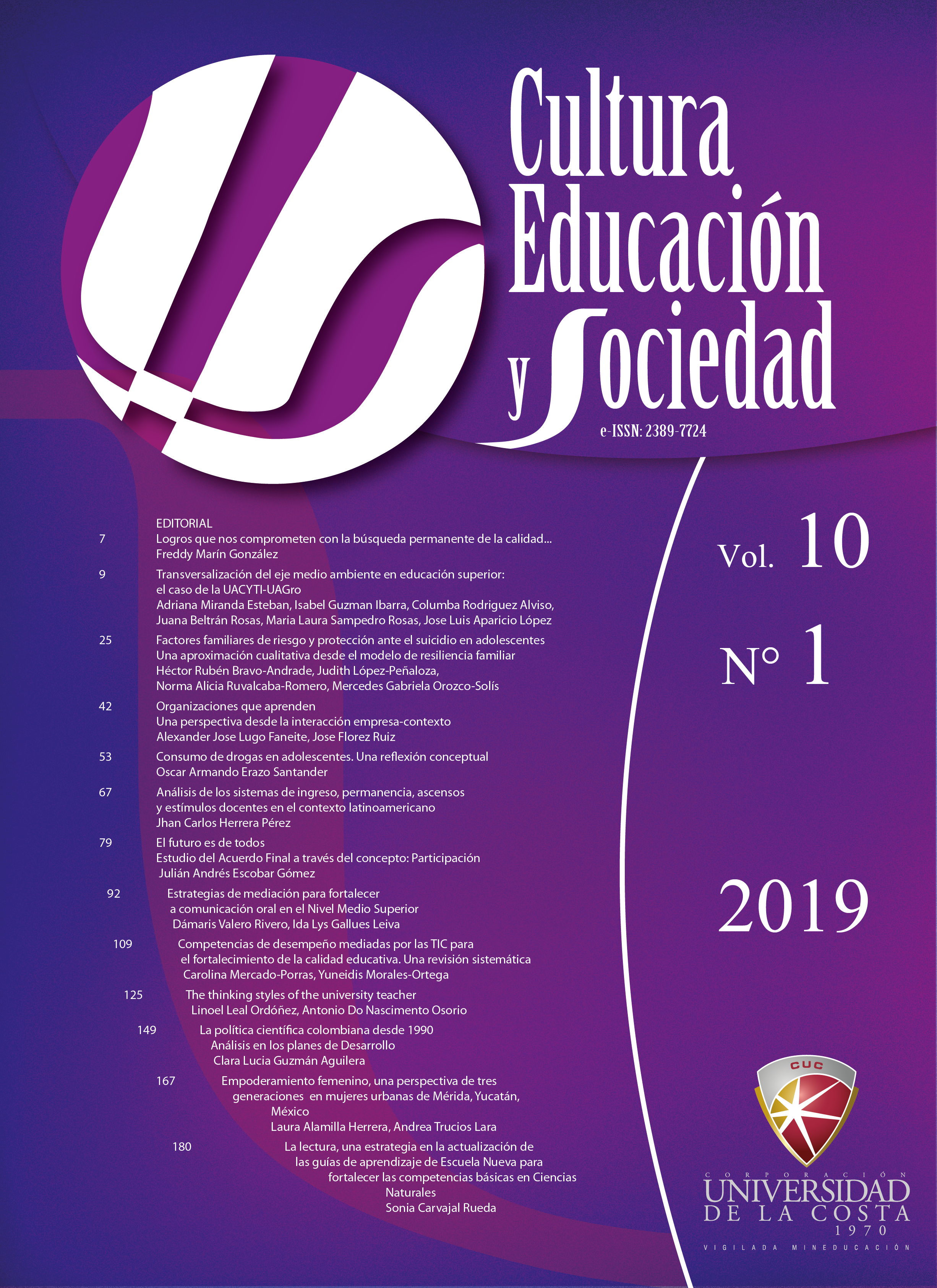The thinking styles of the university teacher
DOI:
https://doi.org/10.17981/cultedusoc.10.1.2019.09Keywords:
Thinking styles, University teachers, Pedagogy, Mediational pedagogies, University educationAbstract
This research is framed in the teachers’ thinking paradigm, oriented to understand the thinking styles of the university teacher from two out of the five cognitive and behavioral expressions in Sternberg’s thinking styles theory: the function inside the classroom and the level of classroom performance. The epistemological approach was the empirical-inductive, framed in the logic positivism tradition, with the case study as methodology. A 24-reactives likert-based scale was applied to 40 teachers of the Education career from Francisco de Miranda University (UNEFM). The results evidenced a mediational thinking style, based on cognitive and constructivism-based teaching procedures, democratic patterns for classroom organization, as well as a permanent process of reflection that informs teachers about what and how to improve while teaching. These results can help to optimize teaching performance, as well as to design pedagogical training processes more focused and based on mediational pedagogies that lead to better learning.
KEY WORDS: Thinking styles, university teachers, pedagogy, mediational pedagogies, university education.
Downloads
References
Ausubel, D., Novak, J. y Hanesian, H. (2009). Psicología Educativa. Un punto de vista cognoscitivo. México, D.F.: Trillas.
Bueno, J. (1998). La interacción profesoralumno. En, J. Bueno y C. Castanedo (Coord.). Psicología de la educación aplicada. Madrid: CCS.
Chacín, M. y Padrón, J. (2016). Investigación y Docencia. Caracas: USR.
Feldman, R. (2005). Psicología con aplicaciones en paises de habla hispana. México, D.F.: McGraw Hill Interamericana.
Gallardo, G. & Reyes, P. (2010). Relación profesor-alumno: arista fundamental para el aprendizaje. Lima: Dilanet.
Gravini, M. (2010). Estilos de aprendizaje: Un factor para tener en cuenta en la orientación profesional. Cultura Educación y Sociedad, 1(1). 75-80. Recuperado de https://revistascientificas.cuc.edu.co/culturaeducacionysociedad/article/view/916
Kenny, A. (2000). La metafísica de la mente. Filosofía, psicología, lingüística. Madrid: Paidós.
Leal, L. (2016a). El aprendizaje autorregulado en estudiantes de educación universitaria. Revista Ciencias Sociales y Educativas de la UNEFM, 6(01). 129-143. [On line]. Disponible en https://issuu.com/revistacienciassocialesyeducativas/docs/rcsevol-6nro1
Leal, L. (2016b). Sobre el enfoque epistemológico vivencialista-experiencialista. Una visión desde el Programa en Teoría de la investigación de José Padrón. Revista Ciencias Sociales y Educativas de la UNEFM, 6(03). 64-72. [On line]. Disponible en https://issuu.com/revistacienciassocialesyeducativas/docs/rcsevol6nro3
Leal, L. (2013). Análisis del aprendizaje autorregulado en estudiantes de educación universitaria. (Investigación). Universidad Francisco de Miranda, Venezuela.
Padrón, J. (2001). La Estructura de los procesos de investigación. Revista Educación y Ciencias Humanas, 9(17). [Online]. Disponible en http://https://www.researchgate.net/publication/277249442
Solar, M. y Díaz, C. (2009). El Sistema de Creencias y Prácticas Pedagógicas y su Implicancia en el Proceso de Enseñanza Aprendizaje. Revista Investigaciones en Educación, 8(2). 74-101.
Schön, D. (1988). El profesional reflexivo. Cómo piensan los profesionales cuando actúan. Madrid: Paidós Ibérica.
Steffens, E., Ojeda, D., Martínez, O., García, J., Hernández, H. y Marín, F. (2017). Niveles de pensamiento crítico en estudiantes de Universidades en Barranquilla (Colombia). Espacios, 38(30). 5-16. Recuperado de https://www.revistaespacios.com/a17v38n30/a17v38n30p05.pdf
Sternberg, R. (1988). Mental self government: A theory intellectual styles and their development. Human Development, 31(1). 197-224.
Toro, A. (2007). Calidad educativa y Educación superior en Venezuela. Valencia: Revista Saberes Compartidos (1). 43-53. [Online]. Disponible en http://servicio.bc.uc.edu.ve/cdch/saberes/a1n1/art6.pdf
Tuckman, B. y Monetti, D. (2011). Psicología Educativa. México, D.F.: Cengage Learning.
Valadez, M. (2009). Estilos de aprendizaje y estilos de pensamiento. Precisiones conceptuales. Revista de Educación y Desarrollo, (11). 19-30. [On line]. Disponible en http://www.cucs.udg.mx/revistas/edu_desarrollo/anteriores/11/011_Huizar.pdf
Van Dijk, T. (2012). Discurso y contexto. Un enfoque sociocognitivo. Madrid: Gedisa editorial
Downloads
Published
How to Cite
Issue
Section
License
Copyright (c) 2019 CULTURA EDUCACIÓN Y SOCIEDAD

This work is licensed under a Creative Commons Attribution-NonCommercial-NoDerivatives 4.0 International License.
![]()
Creative Commons 2020 CULTURA EDUCACIÓN Y SOCIEDAD
This article is under international license Creative Commons Reconocimiento-NoComercial-SinObrasDerivadas 4.0.
The published articles are the sole responsibility of their authors and do not necessarily reflect the opinions of the editorial committee.
CULTURA EDUCACIÓN Y SOCIEDAD respects the moral rights of its authors, who assign to the editorial committee the patrimonial rights of the published material. In turn, the authors inform that this work is unpublished and has not been previously published.
All articles are under a:
Licencia Creative Commons Atribución-NoComercial-SinDerivadas 4.0 Internacional.
![]()


 English
English
 Español (España)
Español (España)




_12.53_.27_p_. m_._3.png)





_12.57_.35_p_. m_._3.png)
_12.50_.37_p_. m_._3.png)



